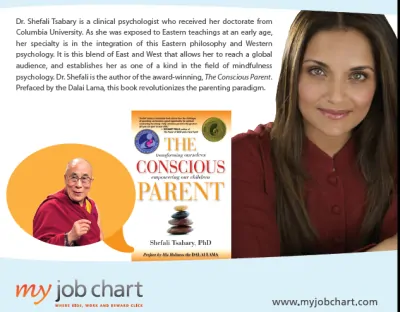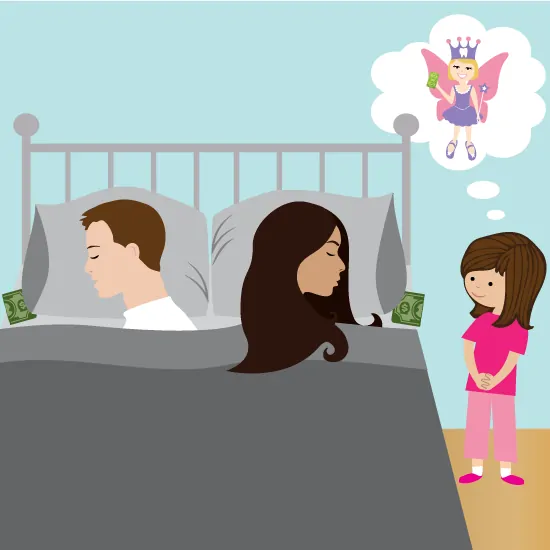This post may contain affiliate links. Read my disclosure policy here.
Today’s guest post was submitted by Dr. Shefali Tsabary, who is working with My Job Chart. We were not compensated to share this post with you. We just absolutely LOVE My Job Chart and the wonderful way in which they help us as parents to teach our kids about chores and organization.
My daughter has always believed in the tooth fairy. I have always let her. The magic, excitement and fantasy of having a personal-fairy who leaves gifts has always been an irresistible draw, far surpassing the need to insert a sense of reality into her mind. And then, one day, the tables turned on me when I had my own personal fairy visit.
I still remember when, one morning, my daughter woke me from sleep with great excitement. “The fairy has left you an amazing present,” she whispered. “See what the tooth fairy left you!” I reached under the pillow and found a one dollar note, torn down the middle in exactly half. “Look! The fairy left half a dollar for you, and the other half is under daddy’s pillow.”
I was speechless. I found myself in a dilemma! On the one had she was inviting me to share in the same world of fantasy and magic that I had encouraged her to believe in. Yet, on the other hand, the voice within me wanted to shout, “money doesn’t grow on trees!”
I realized that this was a moment in which how I responded could make or break my child’s spirit. Thankfully, better sense prevailed and I chose to shelve the lesson and tell her how proud I was of that wonderful tooth fairy was so generous to share her dollar with us. My daughter’s eyes responded with a sparkle bright enough the illumine the room.
I tell this story to demonstrate how children, especially our young ones, live entirely from the heart. They are all about feelings. Unlike parents, children do not live in the mental world of intellectualization, organization, planning, or judgment. They just are. Pure being.
As parents who live in the practical world of endless doing – schedules, chores, lists and calendars – we are often at odds with our children. Teaching them to live in the world of adult rules, protocol and time tables is a challenge all of us face. A parent once shared exasperatedly, “a walk in the park takes over an hour because my daughter likes to stop and smell every flower! We are always late for school!” This exasperation is true for many parents caught in the maelstrom of getting their kids to accomplish certain goals while yet, attempting to hold onto a certain childlike sense of exploration and wonder.
Our children live in a world of endless imagination and fantasy. Unfortunately, the world doesn’t allow for their enviable capacity to dream, play and wander.
So how do we bridge this gap? How do we allow our children to hold onto their heart and magical worlds but still move to a practical beat? How do we balance the being versus the doing? Dancing this fine line between the mundane and the magical is at the heart of conscious parenting.
Young children who have not yet developed the capacity for internal regulation need our help. They need encouragement and positive reinforcement. During these years, it is the parent’s job to introduce as much fun, spontaneity, creativity and magic into the practical tasks of brushing teeth, washing faces, making beds, and doing their ABC’s. The more attuned the parent is with their child’s inner fantasies, the more successful will they be in helping their young children create a bridge between their worlds and ours.
As children grow older, they can learn to schedule their own time, mastering the valuable skills of time management and efficiency. Parents can find unique ways to reward them for these growing capacities, always remembering that the best rewards are those that are created and worked towards by the child themselves.
Children learn best when they see the fruits of their labor on their own accord. Experience is the best teacher. It is our job as their parents to provide them as many opportunities to experience self-sufficiency and self-worth. When we allow them chances to contribute toward the household in a positive manner, this immediately helps raise their sense of self, and belonging in the home. Children long to succeed; it is the onus of us parents to allow them safe avenues to witness their accomplishments. Children who feel purposeful and self-directed mature into resilient, competent and empowered adults.
Do you feel the same way? Share your thoughts in the comments below.

Prefaced by the Dalai Lama, this book revolutionizes the parenting paradigm.











Longwood Dentist says
Wonderful post Dr. Tsabary! There is certainly a period of time during childhood when the best we can do as parents and caregivers is to guide them with gentle reinforcement and be the good example of behaviors and habits we’d like them to develop.
Lauren says
My kids believe in the tooth fairy. She was supposed to stop by last night but didn’t. I guess she was too tired. ;)Hopefully she stops by tonight!
Michele Partridge says
Thanks for this post. Had to deal with this on Sat. My 9 yr. old daughter got mad at me because I kept lying to her about the tooth fairy. So I told her the truth… mommy works for the toothfairy. She got mad again. Ok, all parents work for the toothfairy. She stared at me still furious. So I said, you know what, you are going to gr. 4 and are old enough to know the truth. Yes we do help the toothfairy. With that she smiled and walked away. That part is done. Now onto the Santa dilemma! 🙂
Tracey says
Thanks for reminding us that that best rewards are those that are created and worked towards by the child themselves.
Heidi C. says
I have always let my kids believe in Santa Claus, the tooth fairy, etc. Childhood should be a magical time for them and beliefs like these just add wonder to their worlds.
Janet Ridgeway says
I have always allowed my children to believe in the Tooth Fairy and encouraged their imaginations and creativity. My youngest daughter, 9 years old, just recently figured out the truth about the tooth fairy and was so proud of herself for figuring it out. It was actually a very fun moment for my daughters and I.